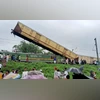)
Kolkata: Locals gather after the Kanchanjungha Express collided with a goods train, near New Jalpaiguri railway station, on Monday, June 17, 2024. (Photo : PTI)
The accident between Kanchenjunga Express and a goods train last month which killed 10 people and injured many others, has been called an “accident-in-waiting” by the Commissioner of Railway Safety (CRS) due to faults at multiple levels of the administration and station staff, according to the investigative body’s report.
According to the CRS, a wrong paper authority to pass (T/A 912) was issued to the crew of the goods train by the authorities, and the fact that this authority didn’t mention any speed guidance for the loco pilot while crossing the signal made matters worse.
The accident has been classified under the “Error in Train Working” section. “Due to improper authority and that too without adequate information, such an incident was an “accident-in-waiting,” CRS said.
Seven trains that passed the defective signal showed different speed patterns. According to the CRS report, only the Kanchenjunga Express followed the laid down protocol which says that loco pilots should proceed with caution, implying that there is no clarity on protocol on the ground, causing serious safety risks.
“It is really a matter of concern that if the teachers itself (Traffic inspector and chief Loco inspectors) are not aware of the subject, what knowledge will they impart to students (loco pilot and SS/SM),” the CRS said.
The CRS also brought out the role of automatic signalling.
“There have been 275 failures in the auto section of Katihar division since its commissioning in January. 2023 till 20th, June 2024… The large number of signalling failures in the automatic section is defeating the very purpose of mobility enhancement and causing safety concerns,” the report said.
Meanwhile, the ministry of railways has standardised the operating procedure for train crew in case of such failures, the railway board announced today.
“The Authority form has been changed so that there is no possibility of misinterpretation. The training of loco pilots/assistant loco pilots has been further strengthened. Authority forms of different zones have been standardised so that Loco pilots across the country see the same form. To increase the reliability of signalling equipment, an action plan is being prepared with the zones under the chairmanship of RDSO,” the board said.
The CRS also said that the implementation of Kavach needs to show on ground to avoid collisions.
“This underscores the need for implementation of the Automatic Train-protection system (KAVACH) on top priority. Use of non-signalling-based systems such as Artificial intelligence-based detection of the RED aspect of the signal and providing an early warning to the loco pilot/GPS-based anti-collision systems shall be explored for provision in locomotive cabs across Indian Railways in non-ATP (automatic train protection) territory,” it said.
First Published: Jul 17 2024 | 11:16 AM IST


































